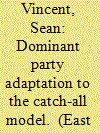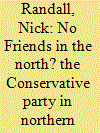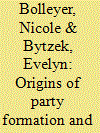| Srl | Item |
| 1 |
ID:
186831


|
|
|
|
|
| Summary/Abstract |
The Communist Party of China’s transition from a revolutionary party to a ruling party has been accompanied by challenges to its legitimacy owing to issues of corruption and poor governance. As a result, the Party’s leadership has time and again laid stress on discipline and unity on internal governance, in other words, as a way of overcoming its shortcomings. This article looks at two approaches towards internal governance under current General Secretary Xi Jinping. The first, it argues, is a stress on the fervour and ideals of a past revolutionary era as the Party tries to reinforce its legitimacy to rule. The second is a strategy of greater control over the work of the state. Essentially, the Party is integrating the state ever closely with itself as a way of validating the effectiveness of its internal governance.
|
|
|
|
|
|
|
|
|
|
|
|
|
|
|
|
| 2 |
ID:
156253


|
|
|
|
|
| Summary/Abstract |
In the process of democratisation, it is expected that a former dominant party, at least one which abides by the rules of electoral contestation, will transition into a “catch-all” party. A catch-all party aims to attract the votes of all social cleavages and classes of voters outside what would be considered their traditional voter base. As part of the wider debate about democratisation in East Asia, this paper examines how two of East Asia’s liberal democracies—Japan and South Korea, the LDP and GNP/Saenuri, respectively, have adapted to electoral defeat and in what ways they have transitioned into catch-all parties in the Kircheimer mould. This paper finds that while intra-party reforms which could fit a catch-all model have yet to be institutionalised, data from the Comparative Manifesto Database shows that there has been a significant change in which policies both parties promote and that these are designed to appeal to a broad base of voters.
|
|
|
|
|
|
|
|
|
|
|
|
|
|
|
|
| 3 |
ID:
185173


|
|
|
|
|
| Summary/Abstract |
Much literature covers how the rise of the Bharatiya Janata Party (BJP) in India impacted on the political marginalisation of Muslims, while it has not been examined in sufficient depth how the internal dynamics of Congress contributed to this decline in Muslim nominations for elections. This article examines the Congress party’s organisational circumstances that affected Muslims’ electoral representation in 1980s Gujarat. It demonstrates that, along with the influence of competing Hindutva forces, the ongoing ‘deinstitutionalisation’ of the Congress party also damaged the political representation of Muslims. Interview accounts and archival documents indicate how factional fighting within Congress subverted the faction-like consolidation of the Muslim leaders’ negotiation power. The article argues that despite vertical and dyadic ties with Hindu leaders inside the party, Muslim Congressmen could not attain unified leadership to generate sufficient pressure on the party to nominate Muslims for elections.
|
|
|
|
|
|
|
|
|
|
|
|
|
|
|
|
| 4 |
ID:
092363


|
|
|
|
|
| Publication |
2009.
|
| Summary/Abstract |
Having won just 19 of 162 seats in northern England at the 2005 general election, the Conservative party under David Cameron's leadership has made an electoral revival in the north of England a particular priority. This article first outlines the Conservatives' post-war electoral record in the north and considers the significance of northern England to the party's strategy at the next general election. It then moves on to examine the potential for socio-economics, identity, memory, ideology and party organisation to frustrate its current ambitions for revival. Finally, it outlines and evaluates the initiatives which the party has undertaken in the north of England since 2005.
|
|
|
|
|
|
|
|
|
|
|
|
|
|
|
|
| 5 |
ID:
123011


|
|
|
|
|
| Publication |
2013.
|
| Summary/Abstract |
Which new parties entered national parliaments in advanced democracies over the last four decades and how did they perform after their national breakthrough? This article argues that distinguishing two types of party formation (that facilitate or complicate party institutionalisation) helps to explain why some entries flourish, while others vanish quickly from the national stage. New parties formed by individual entrepreneurs that cannot rely on ties to already organised groups are less likely to get reelected to parliament after breakthrough than rooted newcomers. This hypothesis is tested on a newly compiled dataset of new parties that entered parliaments in 17 advanced democracies from 1968 onwards. Applying multilevel analyses, the factors that shape newcomers' capacity to reenter parliament after breakthrough are assessed. Five factors have significant effects, yet affect party performance only in particular phases: both a party's electoral support at breakthrough and its operation in a system with a strong regional tier increase the likelihood of initial reelection. In contrast, a distinct programmatic profile, the permissiveness of the electoral system and easy access to free broadcasting increase a party's chance of repeated reelection. Only formation type significantly affects both phases and does so most strongly, substantiating the theoretical approach used in this article.
|
|
|
|
|
|
|
|
|
|
|
|
|
|
|
|